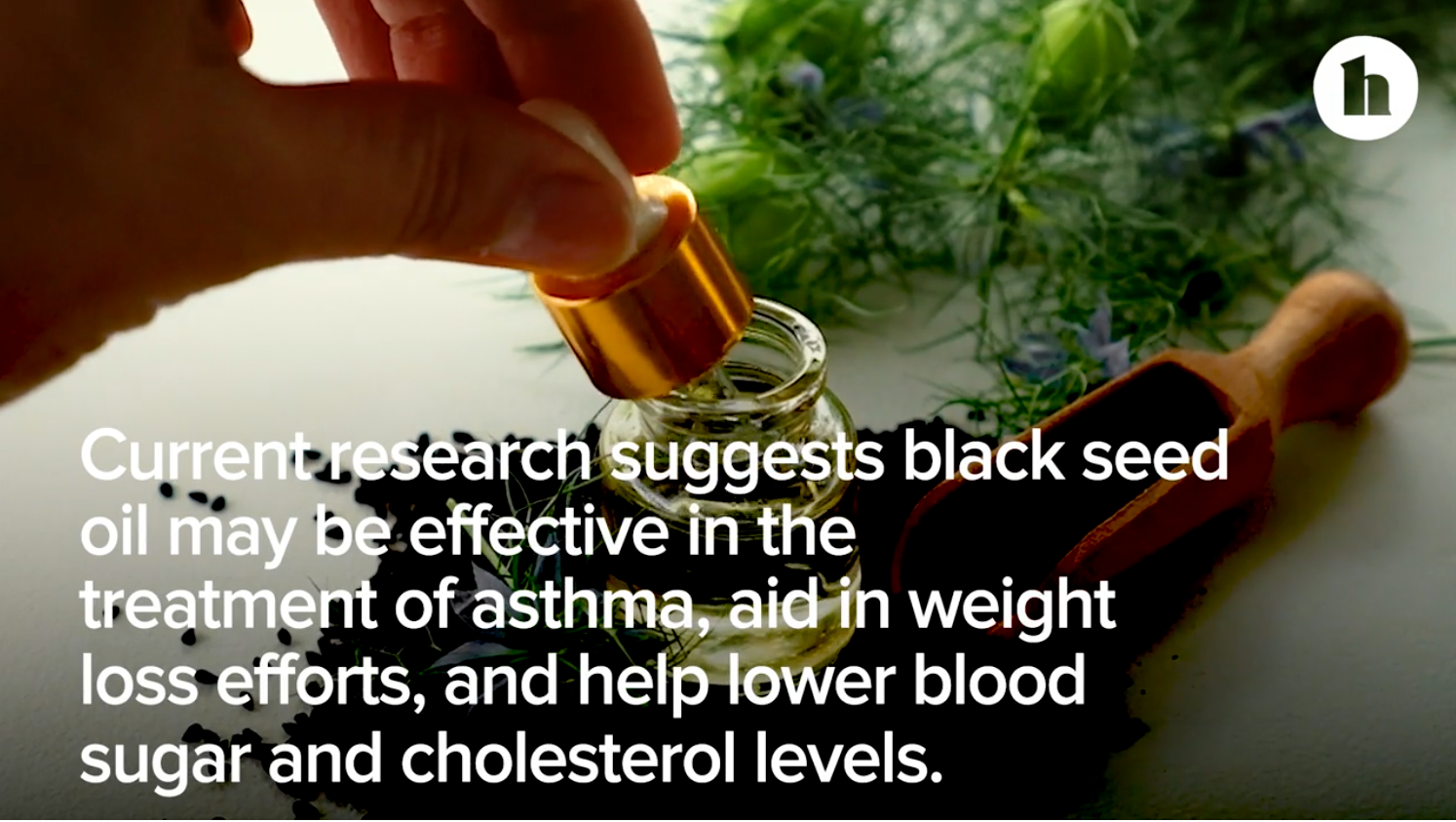
The science behind the health benefits of black seed
Posted by Mareya Ibrahim on
Reproduced from Healthline
Black seed comes from the plant Nigella sativa and is the main ingredient in our Superfood Sprinkle blends. We wanted to share a little of the history of this wonder of a little seed and all of the associated health benefits backed by science, including weight loss, lowering blood sugar levels, protecting brain health, lowering blood pressure and cholesterol, asthma, shrinking cancer tumors and much more.
THE BACKGROUND OF BLACK SEED
Nigella sativa (N. sativa) is a small flowering plant that grows in Southwest Asia, the Middle East, Southern Europe, and Northern Africa (1Trusted Source).
This shrub also produces fruit with tiny black seeds. Commonly referred to as simply black seed, N. sativa seeds go by many other names, including black cumin, black caraway, nigella, fennel flower, and Roman coriander (2Trusted Source, 3).
Black seed oil is extracted from N. sativa seeds and has been used in traditional medicine for over 2,000 years due to its many therapeutic benefits.
Studies suggest it may have numerous applications for health, including the treatment of asthma and aiding weight loss. It’s also applied topically to benefit skin and hair (1Trusted Source, 2Trusted Source, 4Trusted Source, 5Trusted Source).
This article reviews the potential health benefits of black seed oil, as well as any possible side effects and dosing information.
In traditional medicine, black seed oil has been used to treat a variety of health conditions. As a result, it has sometimes been referred to as “panacea” — or universal healer (4Trusted Source, 6Trusted Source).
While not all of its proposed medicinal uses have been proven to be effective, black seed oil and its plant compounds have been linked to several benefits for health.
High in antioxidants
Black seed oil is high in antioxidants — plant compounds that help protect cells against damage caused by unstable molecules called free radicals (7Trusted Source, 8Trusted Source, 9Trusted Source, 10Trusted Source).
Antioxidants are important for health, as research has shown that they can reduce inflammation and protect against conditions like heart disease, Alzheimer’s disease, and cancer (11Trusted Source).
In particular, black seed oil is rich in thymoquinone, which has potent antioxidant and anti-inflammatory effects. As a result, studies suggest this compound may protect brain health and aid in treating several types of cancer (7Trusted Source, 12Trusted Source, 13Trusted Source, 14Trusted Source).
May help in treating asthma
Asthma is a chronic condition in which the lining of your airways swell and the muscles around them constrict, making it difficult for you to breathe (15Trusted Source).
Research has shown that black seed oil, and specifically thymoquinone in the oil, may help in treating asthma by reducing inflammation and relaxing muscles in the airway (4Trusted Source, 16Trusted Source, 17Trusted Source).
One study in 80 adults with asthma found that taking 500 mg of black seed oil capsules twice a day for 4 weeks significantly improved asthma control (16Trusted Source).
While promising, larger and longer studies are needed to assess the long-term safety and effectiveness of black seed oil supplements in the treatment of asthma.
May aid weight loss efforts
While the exact mechanism isn’t fully understood, research shows that black seed oil may help reduce body mass index (BMI) in individuals with obesity, metabolic syndrome, or type 2 diabetes (18Trusted Source, 19, 20Trusted Source).
In one 8-week study, 90 women ages 25–50 with obesity were given a low calorie diet and either a placebo or 1 gram of black seed oil per meal for a total of 3 grams per day (21Trusted Source).
At the end of the study, those taking the black seed oil had lost significantly more weight and waist circumference than the placebo group. The oil group also experienced significant improvements in triglyceride and LDL (bad) cholesterol levels (21Trusted Source).
Despite these promising results, more research is needed on the long-term safety and efficacy of taking black seed oil for weight loss.
May lower blood sugar levels
For individuals with diabetes, consistently high blood sugar levels have been shown to increase the risk of future complications, including kidney disease, eye disease, and stroke (22Trusted Source).
Several studies in individuals with type 2 diabetes indicate that a dose of 2 grams per day of crushed whole black seeds may significantly reduce fasting blood sugar levels and hemoglobin A1c (HbA1c) levels, a measure of average blood sugar levels over 2–3 months (23Trusted Source, 24Trusted Source, 25Trusted Source).
While most studies use black seed powder in capsules, black seed oil has also been shown to help lower blood sugar levels (25Trusted Source).
One study in 99 adults with type 2 diabetes found that both 1/3 teaspoon (1.5 mL) and 3/5 teaspoon (3 mL) per day of black seed oil for 20 days significantly reduced HbA1c levels, compared with a placebo (26).
May help lower blood pressure and cholesterol levels
Black seed oil has also been studied for its potential effectiveness in reducing blood pressure and cholesterol levels.
High blood pressure and high total and LDL (bad) cholesterol levels are important risk factors for heart disease (27Trusted Source).
Two studies, one in 90 women with obesity and the other in 72 adults with type 2 diabetes, found that taking 2–3 grams of black seed oil capsules per day for 8–12 weeks significantly reduced LDL (bad) and total cholesterol levels (21Trusted Source, 28).
Another study in 90 people with high cholesterol levels observed that consuming 2 teaspoons (10 grams) of black seed oil after eating breakfast for 6 weeks significantly reduced LDL (bad) cholesterol levels (29).
The oil may also help lower blood pressure.
One study in 70 healthy adults noted that 1/2 teaspoon (2.5 mL) of black seed oil twice a day for 8 weeks significantly reduced blood pressure levels, compared with a placebo (30Trusted Source).
While promising, the overall research on black seed oil in reducing blood pressure and cholesterol levels is limited. More research is needed to confirm the optimal dose.
May protect brain health
Neuroinflammation is inflammation of brain tissue. It’s thought to play an important role in the development of diseases like Alzheimer’s and Parkinson’s (13Trusted Source, 31Trusted Source).
Early test-tube and animal research suggests that thymoquinone in black seed oil may reduce neuroinflammation. Therefore, it may help protect against brain disorders like Alzheimer’s or Parkinson’s disease (13Trusted Source, 32Trusted Source, 33Trusted Source, 34Trusted Source).
However, there’s currently very little research on the effectiveness of black seed oil in humans specifically regarding the brain.
One study in 40 healthy older adults found significant improvements in measures of memory, attention, and cognition after taking 500 mg of N. sativa capsules twice a day for 9 weeks (35Trusted Source).
Still, more research is needed to confirm black seed oil’s protective effects for brain health.
May be good for skin and hair
In addition to medical uses, black seed oil is commonly used topically to help with a variety of skin conditions and to hydrate hair.
Research suggests that due to its antimicrobial and anti-inflammatory effects, black seed oil may help in treating a few skin conditions, including (36Trusted Source, 37, 38Trusted Source):
- acne
- eczema
- general dry skin
- psoriasis
Despite claims that the oil can also help hydrate hair and reduce dandruff, no clinical studies support these claims.
Other potential benefits
Black seed oil may have other benefits for health, including:
- Anticancer effects. Test-tube studies have shown thymoquinone in black seed oil to help control the growth and spread of several types of cancer cells (39Trusted Source, 40Trusted Source).
- Reduce symptoms of rheumatoid arthritis. Due to its anti-inflammatory effects, limited research suggests that black seed oil may help reduce joint inflammation in people with rheumatoid arthritis (41Trusted Source, 42Trusted Source, 43Trusted Source).
- Male infertility. Limited research suggests that black seed oil may improve semen quality in men diagnosed with infertility (44Trusted Source, 45Trusted Source).
- Antifungal. Black seed oil has also been shown to have antifungal activities. In particular, it may protect against Candida albicans, which is a yeast that can lead to candidiasis (46Trusted Source, 47Trusted Source).
While early research shows promise in the applications of black seed oil, more studies in humans are needed to confirm these effects and the optimal dosage.
summaryBlack seed oil is high in antioxidants and may have several benefits for health. These include the treatment of asthma and various skin conditions, lowering blood sugar and cholesterol levels, aiding in weight loss, and protecting brain health.





































